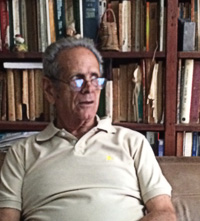 When I was asked to address you in English to introduce José Martí and his contextual scenario, I thought it best to put in writing, not just the well known facts of the life of our national hero, but at least part of our own research for the Critical Edition of his Complete Works, which I hope will interest you.. It is nevertheless useful that I convey to you a basic perspective of his life, which I hope will help you understand the complexities of his revolutionary tasks in the expiring days of the nineteenth century.
When I was asked to address you in English to introduce José Martí and his contextual scenario, I thought it best to put in writing, not just the well known facts of the life of our national hero, but at least part of our own research for the Critical Edition of his Complete Works, which I hope will interest you.. It is nevertheless useful that I convey to you a basic perspective of his life, which I hope will help you understand the complexities of his revolutionary tasks in the expiring days of the nineteenth century.
We all know he was born in Havana on January 28, 1853 in a modest Spanish family. His father was a Sargent in the artillery corps of the Spanish Army, reaching in later days the rank of liutenant. His mother was a simple housewife born in the Canary Islands off the coast of Africa.
It has always been a mystery to many of us how early in his life Martí began showing his creative potential, his literary and political genious, his capacity for political analysis and strategic thought, and above all his his ethical principles and sense of social justice. When he was just nine years old, he accompanied his father, designated district judge in Hanábana in what is today Las Villas province, a hotbed of infiltration of slaves from Africa. Already proficient in his written Spanish, Martí helped his father, who was not especially capable of putting his ideas in a readable Spanish, as a scribe for official paperwork. There he witnessed the horrors of slavery. Years later he wrote in his personal notebook: “What human being, who has seen a black man being flogged, does not consider himself forever in debt with him? I saw him when I was still a child, and the shame is still vivid in my memory […]. I saw him, and from then on I swore to myself I would always defend him”.
He was, in short, a true man, endowed with qualities we would like our sons and daughters to have. And that is why we are doing our best to preserve for future generations the enormous wealth of knowledge, the treasure of the many documents that he bequeathed us; his overwhelming literary and political achievements, his twenty-eight volumes of essays, articles, poetry, drama, letters and novels, forerunners of modernism, thought to be by the greatest writers and critics of his time and ours among the best written in the Spanish language.






